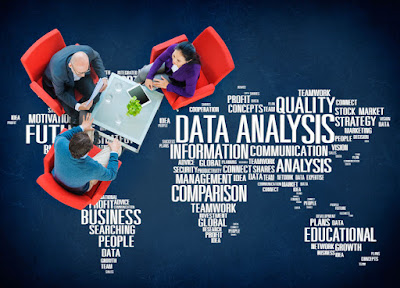 |
| Learning Business Analytics |
Business Analytics find application for gaining insights that influences business decision making and can be utilized to optimize and automate business process. Companies that gets driven by data treat the data resources as corporate assets and leverage these assets to gain competitive benefits. Successful Business Analytics largely depends on the quality of the data, skill & expertise of the analyst and the holistic commitment of the organization to take business calls, driven by data.
Few instances of Business Analytics
- Exploring data for finding new relationships and patterns
- Quantitative and Statistical Analysis that explains the reasons beyond the occurrence of specific results.
- Experiments for testing previous business decisions
- Forecasting future outcome
Once, the business objectives of the analysis get determined, a methodology for analysis is picked and data gets acquired for supporting the analysis. The process of data acquisition often involves data extraction from a single or multiple sources, cleansing and subsequently, integrating the data into the data mart or data warehouse. Typically, this process is executed with the data sample of smaller sizes.
What are the tools used in Business Analytics?
Tools for business analytics vary between statistical-functions enabled spreadsheets to intricate data mining as well applications for predictive modeling. As the relationships and patterns in the data get unveiled, new queries come up and the analytical methodology iterates, till the time the business objectives are met.
The deployment of predictive models involves scoring data records and utilizing those scores for the optimization of real-time decision making within the scopes of business process and applications. Business Analytics even supports in taking tactical decisions, responding to unforeseen events and in the majority of the cases, the decision making functions get automated for supporting responses on real-time.
What are the key differences between business intelligence and analytics?
Though the terms business analytics and business intelligence gets used interchangeably, there are a few key points of differences:
- Business Intelligence raises the questions like the instances taking place, the time such incidents happened, the key stakeholders beyond the process as well as the quantitative aspect. On the other hand, Business analytics deal explores the reasons for the occurrences of such incidents, if there are chances of such incidents to happen again, and the outcome if certain conditions are changed.
- Business Analytics majorly deals with Quantitative and statistical analysis, while, Business intelligence deals with reporting metrics and KPIs.
- The scope of Business Intelligence deals with automated monitoring, dashboards, scorecards, and Ad Hoc Query, while BA deals with predictive modeling, data mining, and Multivariate testing.
Identifying the growing demand for Business Analytics, vendors for BI applications are including a BA functionalities to some extent in their products. The major vendors for enterprise systems have embedded analytics as well, and this trend of emphasizing on analytics is foreseen the usual turnaround time between business events and response/decision. Hence, with the passage of time, businesses are expected to give more importance on business analytics to reduce the time lag in decision making, as well to ensure better decision making.
Consult “DataMites”, if you are looking for business analytics courses like Data Science in Bangalore location. Experience faculty. You can sign up for either online or classroom training.